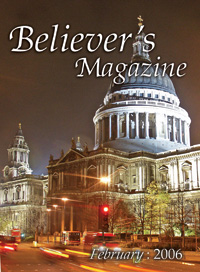What God hath Joined, by W Banks & T Wilson; published by Gospel Tract Publications; available from John Ritchie Ltd; price £7.95.
What God hath Joined is an attempt to answer contemporary issues in marriage from the Scriptures. In recent years our society has witnessed an extraordinary change in attitudes towards sex and marriage. Family values are eroded, immorality is rampant, marital separations and divorces are common, causing untold sorrow and suffering. Christian families are affected and many perplexed believers are looking for answers. This is therefore a very timely book.
What God hath Joined seeks to provide scriptural guidance for the current situation and the many problems that have to be faced. The volume has 133 pages consisting of 12 separate chapters on different but related subjects authored by 8 experienced and respected brethren. It includes a very useful index of Scriptures for ease of reference. It is a carefully constructed and comprehensive examination and exposition of many Old Testament and New Testament Scriptures relevant to the subject.
The book’s main premise is that "marriage is creational" and its principles apply equally to believers and unbelievers. It is argued that divorce and remarriage are expressly forbidden in the New Testament Scriptures, and when remarriage does occur after divorce, a state of "perpetual adultery" exists. The contentious "exception clause" of Matthew’s Gospel is dealt with, which doubtless will meet with some disagreement. The general view propounded, however, is clearly the divine ideal, but will be regarded by many as too radical and impractical a position. The authors rest their case for the "indissolubility of marriage" on the Scriptures of truth.
The writers are sensitive to the fact that there are many godly and gifted brethren, past and present, who have alternative views. They also acknowledge that these issues are controversial, complex and highly emotive, and they are conscious of the practical implications in terms of relationships and assembly fellowship. Nevertheless they insist that the glory of God and the purity of the assemblies of God’s people must be preserved at all costs.
Whatever view may be held, the book is worthy of careful consideration, especially by responsible brethren who have the unenviable task of dealing with the delicate and emotive matters of marital problems. It is highly recommended.
RLD
Broken Minds, by Steve and Robyn Bloem; published by Kregel Publications; available from John Ritchie Ltd; price £9.50.
Broken Minds is not a good book for bed-time. It deals with mental illness, a topic that elicits "frightening images of uncontrolled behaviour, hospital confinement and destructive violence". The descent into major depression chronicled is harrowing for the reader, but clearly was blacker still for the husband and wife team who authored the book. Steve Bloem suffered mental illness from a relatively early stage of their marriage. As a result, both he and she suffered immeasurably over a long period.
The authors are seeking not sympathy but understanding. From their personal experience, the Bloems identify historical personages they adjudge to have suffered mental illness. They list Winston Churchill, Abraham Lincoln, Jonathan Edwards, Charles Spurgeon and not unexpectedly William Cowper. That chapter provides some encouragement to those struggling with the effects of depression and other illnesses in their close circle of relatives and friends.
We certainly learn from the Bloems that a number of the diagnoses offered by "Christian" counsellors can do a great deal of damage: demon-possession, sin in the life, a failure to yield to the Lord … Often, the authors note, there is an unwillingness to consult a doctor and to take prescribed medicine. Broken Minds cautions against these attitudes and what they call "christianised Freudian theory". Examples are provided of men like Job and Elijah who knew depression, but the missing dimension in the book is the exposition of passages like 1 Kings 19 in the Old Testament and 2 Corinthians 1 in the New Testament.
At a time when governments are trying to dispel the stigma of mental illness, there is an awareness that terms like "depression" are loosely used and the reality of the condition not well understood. Regrettably, the matter is rarely treated from a biblical standpoint. All too often, glibly terms are used that leave the sufferers with added hurt and little light. Broken Minds will provide some understanding of the hurt but little light from Scripture.
TW









